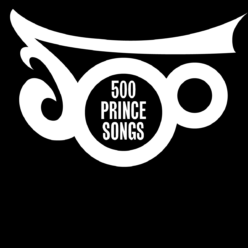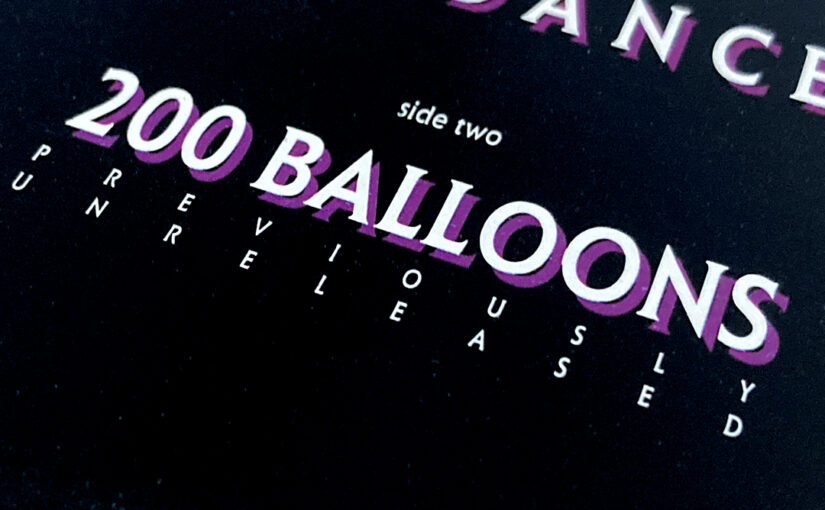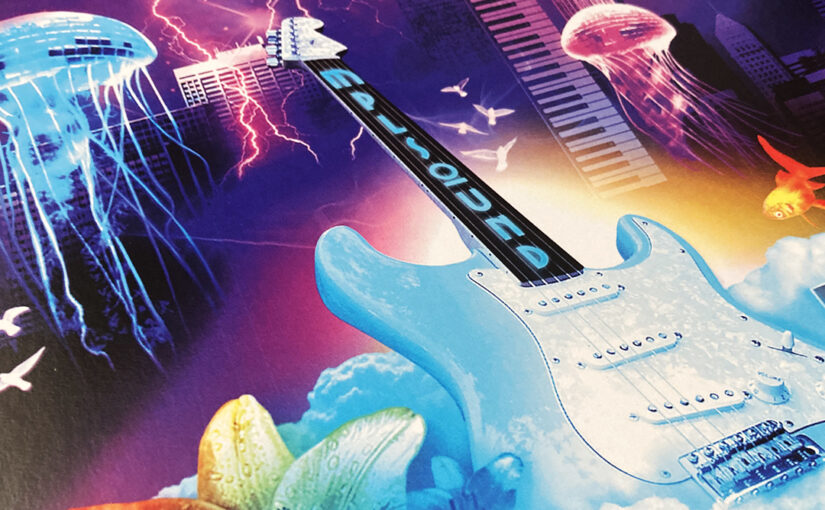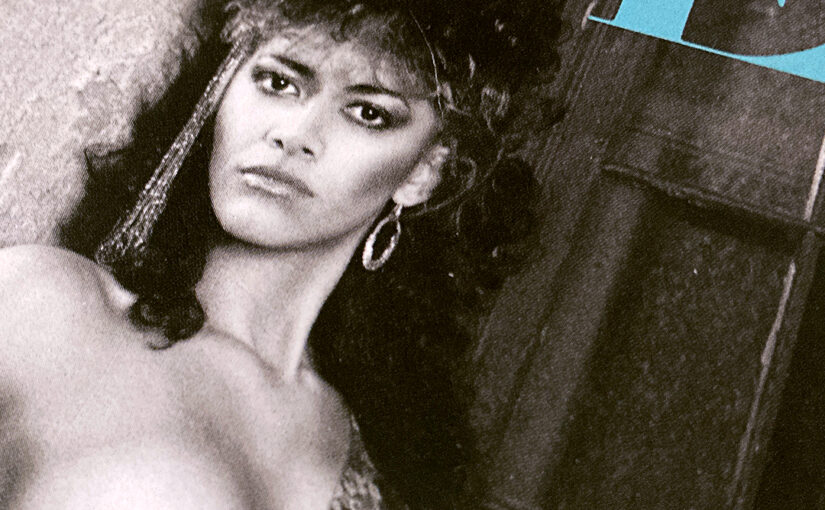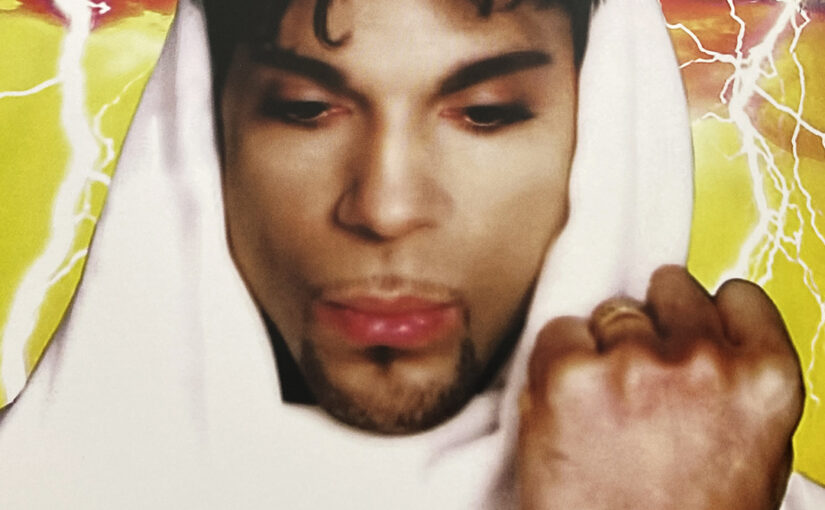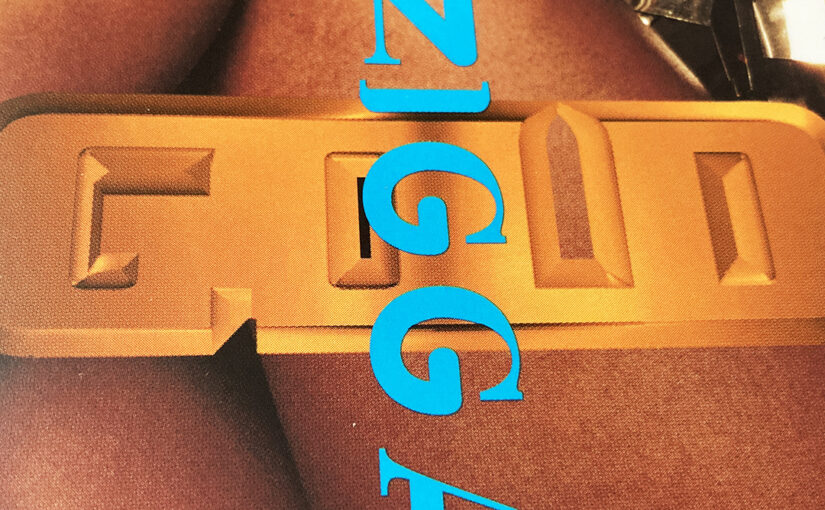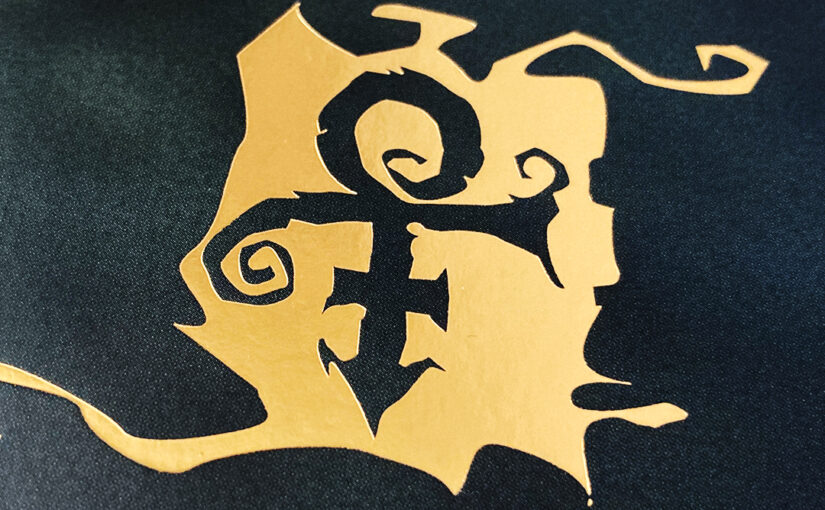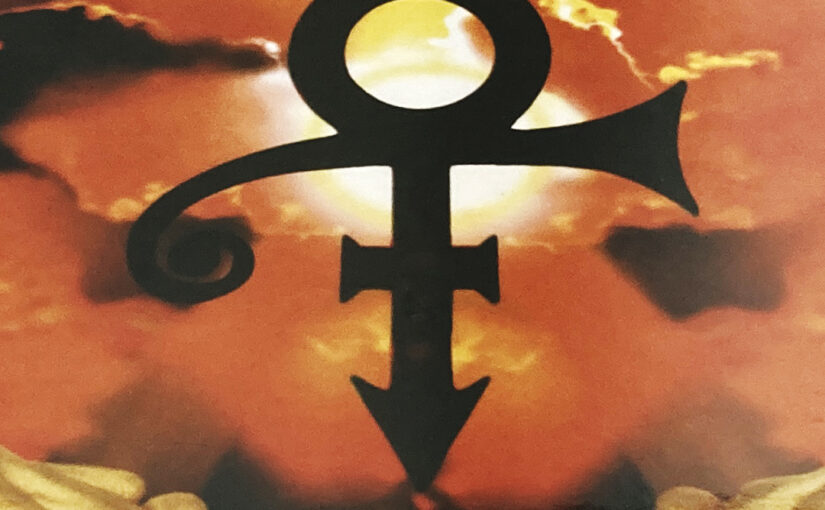Batdance single (1989) / The Hits/The B Sides (1993)
Outnumbering Nena’s balloons by 101 and intended to be just as destructive, 200 Balloons was written for the parade scene in Tim Burton’s Batman where the float-riding Joker throws handfuls of cash to the Gotham crowd before the planned release of the poisonous gas filled orbs. As an aside, have you ever paid attention to the translated lyrics of 99 Red Balloons? They’re completely batshit crazy! This is no sane fish itself though and gave birth to the even more bonkers Batdance, which began life as a 200 Balloons remix but ended up usurping its place on the album. Relegated to B-side status, this buoyant pop song channels the Joker beautifully, with a maniacally upbeat attitude which gradually unravels into fragmented lunacy. Like Prince sings: his “funk is multilayered” and there’s samples of Mavis Staples singing “get your house in order” and Rave Unto The Joy Fantastic chants also thrown into the mix. Ultimately his Baby I’m a Star cheap knock-off Trust was used in the film instead, matching the director’s original vision but making the accompanying soundtrack album weaker as a result.
414: Arrogance
O(+> (1992)
Brief and intense like a rap tomatillo, Arrogance is the first half of a one two punch of hip hop in the midst of Prince’s unpronounceable rock opera concept album. A safe space for any kid weened on Public Enemy, struggling to process ballads and pop rock. At school, before the available musical landscape revealed itself as a hypercube of myriad dimensions, it was pretty binary. You were rock or you were hip hop. You listened to Guns N’ Roses or Salt N’ Pepa. Def Leppard or Def Jam. My flag was planted firmly in the hip hop camp. I didn’t get to hear this album until the latter end of the decade when such petty tribal affiliations had been lost along with my milk teeth but the conditioning was still there to make Arrogance and The Flow, along with the first two, more single-worthy, tracks all stand out. Whenever I hear shade thrown at any of these (and Arrogance gets more than its fair share) I instinctively take it as a poodle-haired broadside from the Guns N’ Roses trench. Old loyalties stir within. Feuds awaken. And the fact that I’m rating this below the theatrical rock silliness of 3 Chains o’ Gold pains me on some deep atavistic level, but is as much a sign of Arrogance‘s slightness than it is of maturing tastes. The beat has an Eric B & Rakim vibe to it and if you listen close you can even hear their Bobby Byrd “you got it” sample, from the classic I Know You Got Soul. The inclusion here is distorted almost beyond recognition though and sounds more like something from The Exorcist than a sampled affirmation. A banshee screech from beyond the veil. Arrogance, true to its name, manspreads over the end of previous track, Damn U, turning the ballad’s air salty with its “this one’s for all the whores” dedication. By which he means journalists, in particular Vanessa Bartholomew who bookends the Q&A lyrics where the title of the song is the brusk answer to queries about Prince’s motivation. It makes more sense within the context of the 3 Chains film, but who cares about narrative cohesion when you’re lost in foreign waters and suddenly hear a language you know and breathe. I would grow up to prefer the slow jams but, like love, the first cuts are the deepest.
415: Gotta Stop (Messin’ About)
Single (1981) / The Hits/The B Sides (1993)
The first non-album track in Prince’s discography and a regular catch with record collectors, rearing its head on the A-side of a couple of UK releases and on the flip of Let’s Work in North America. Despite being paired with songs from Prince and Controversy it’s Dirty Mind through and through. A new wave, keyboard-driven appeal to an unrequited love who’s “messin’ about” with everybody but him, causing him to play with his “toy” so much he’s going to go blind. Gotta Stop (Messin’ About) is as sparse as its Dirty Mind compatriots but feels stiffer and more like the clenched posture of the jealous lover “sittin’ outside your door” on a stake-out. However there’s enough lo-fi fuzz, reverb and synth sweeps to loosen its hard edges. Piet Mondrian colouring outside the lines in sexual frustration.
416: We Can Work it Out
Unreleased (1977)
One of his better early outtakes and the oldest song on this list that never saw a release in any form. It has all the hallmarks of For You era Prince. Falsetto vox. Polished sheen. A guitar solo calling card. The lyrics are directed towards the record company he just signed for and unlike the barbs found in the darker recesses of Chaos and Disorder it’s a message of hope and excitement. “Makin’ music naturally, me and WB.” You can feel the eagerness to please like it’s his first day in the office. And in a way it was. The explosion it ends with was possibly added to show how Prince is about to blow up big, but could be now interpreted as the contractual tumult to follow. To paraphrase John Lennon in the Beatles song of the same name; there’s still time for fussing and fighting, my friend.
417: My Love is Forever
For You (1978)
A song steeped in seventies sheen and Stevie panache, with tantalising glimpses of the future artist peeking through the mirrorball bokeh. There’s the multi-tracked vocals and a synth solo signalling the Minneapolis Sound he would later pioneer, but it’s the electric guitar that really imprints – imprince – his mark. An unconventional addition for the genre but more candidly emotive than anything the lyrics could muster. The words were not even Prince’s. Borrowed largely from a song a former producer had written, they later resulted in litigation and an out of court settlement. But they’re the weakest element of My Love is Forever and as meaningful as the “doo doo doo”s in the refrain. Aural texture. So play the song over the sound of running taps as you pour yourself a bubble bath and write ‘DEVOTION’ in reverse writing in the bathroom mirror. It’s music to soundtrack pampering and puppy love and the feeling there’s actually nothing conceivably terrible in this world. Innocent fun. Can you believe only two years separate this release from the wedding-gown-ruining Head?
418: Daddy Pop
Diamonds and Pearls (1991)
The era of this album introduced to us a new macho-acting prince, armed with gun microphone, hip-hop and an attitude that would cause Rosie Gaines to later describe him as “kind of a male chauvinist at that point”. She was the only female musician in his new backing band, the NPG, and decided to leave his employ after the Diamonds and Pearls tour, feeling alienated by the gender imbalance and bullied by his trio of male dancers The Game Boyz. You can hear this testosterone shift throughout Daddy Pop with silverback lyrics and groans of “oh daddy, you’re the best” but old habits die hard and his homo-erotic choreography during live shows, and in particular this song’s performance on Arsenio Hall, showed he still knew how to mess with gender expectations. Underneath the Daddy machismo lies the Pop. A vivacious, keyboard-driven appeal to the mainstream, built upon a sped-up loop of Aretha Franklin’s Rock Steady (a song he later covered with Beverley Knight on his Indigo Nights release) and featuring Prince throwing his voice around the octaves like he was possessed by the lost souls of the entire Family Stone. My favourite fact about this recording is that a section from a live performance of Partyman is edited in at the end. A similar throne-polishing song, albeit under the guise of the Joker, reminding us that although the male entourage is new, the self-aggrandising lyrics aren’t. Baby, he’s a star and you sure might know it now.
419: If a Girl Answers (Don’t Hang Up)
Vanity 6 (1982)
This feels like a skit that was bestowed such a top drawer backing beat that it got extended and upgraded to song status. Funny and funky. It features a slap bass riff, adapted from Teena Marie’s Behind the Groove, which for the first half plays as backdrop to the heated conversation you’re eavesdropping in on. Prince uses his Jamie Starr voice to play The Other Woman and has a cuss-off over the phone with Vanity, before Brenda weighs in with a barbed Sugarhill rap. It’s a phone-hack of the band’s own little nasty world. When the actors exeunt, the second half’s stage is given over to the locked groove, with only occasional sung “don’t hang up”s and ringing phones to keep it company. If a Girl Answers sounds a lot like its New York new wave contemporaries: Tom Tom Club and ESG but with necrophilia jokes and cartoon threats of violence thrown in for the lulz.
420: I Will
Chaos and Disorder (1996)
Conjoined on this list as they are on the album, I Will builds on Into The Light‘s piano refrain and jettisons all earthly baggage to soar even higher. If the preceding track was the run-up then this is the subsequent leap of faith into the eternal unknown, gliding through skies like a snowman walking on air, as a Welsh choirboy serenades down below. We’re kept aloft by the aerodynamics of Rosie Gaines’ deep vocals pushing up against Prince’s high register. An effective gender reversal creating an upliftling Bernoulli principle of sound. A love letter to Icarus. The last sixty seconds features a guitar solo in graceful freefall, signalling the final moments of the flight into the sublime before the harsh bump back down to Earth is sounded with the first terra firma beat of Dig U Better Dead. Normal service has been resumed.
421: Into the Light
Chaos and Disorder (1996)
An appropriate title for this song. Not because the lyrics concern reincarnation, or that it’s influenced by Betty Eadie’s self help book Embraced By The Light which describes her near-death experience. Both of these are true, but the reason the title is wholly apt is that for the first time in Chaos and Disorder there’s a break in the bitter clouds, a lull in the hard guitars and snark, and for a six minute period we’re bathed in pure spiritual illumination. A piano-led grace. Unlike the false dawn of the earlier Dinner With Dolores, an incandescent bulb of a song that appears light and poppy but has dark, twisted lyrics which some have taken to be an allegory of his relationship with Warner Bros. None of that cynicism here. The lyrics are hymn-like and when the guitars do come in we get a flash of Gold before it settles into a luminous body of spiritual rock with a saxophone corona. Into the Light doesn’t end, it metamorphosises into the following track I Will, suddenly yet subtly, Abbey Road style. Reborn as a more enlightened being after shedding its light rock carapace.
422: Chocolate Box
MPLSound (2009)
With a nod to Messrs Shakespeare and Gump, shall I compare thee to a box of chocolates? Here Prince offers us an assorted selection of Synth Swirls, Disco Tom-Toms, Guitar Plucks and Drum Snaps. There’s a retro Q-Tip Creme, a flavour that was everywhere in the nineties but leaves little impression here. A Chilli Chocolate that induces involuntary panting. A Nutty Cheer that tastes of B-A-N-A-N-A-S. And a medley of flavours that seem like synthesised favourites from your youth – Eighties Classic and Neptunes Crunch – but adroitly handled by a master (the master) chocolatier. To wring the last dregs of life from this metaphor it’s also sadly true that after repeated consumption of this particular box you start to feel a bit nauseous. I don’t advise consuming ten in a row like I just have.
423: Escape
Glam Slam single (1988) / The Hits/The B sides (1993)
The full title of this B side is Escape (Free Yo Mind From This Rat Race) and it almost didn’t chart in this top 500 due to it edging close to Glam Slam remix territory. There’s not a lot to the song but what there is works hard and eclipses many of Prince’s more intricate and over-thought arrangements, including over two thirds of the meticulously produced Emancipation album. When a beat’s this good, who needs window dressing? Escape starts with a dawn raid hammering followed by Prince conducting the snare drum into a funky ass groove. Then you’re hit with a bassline so heavy you could rest a round of beers on it. Sprinkle with crowd-noise and repeat until dancing. The version on 1993’s The B Sides compilation fades out halfway through so you’re denied the pleasure of hearing Eric Leeds’ saxophone stretch its legs and Prince’s final “crucifixion goin’ down, down, down…” pay-off. If the edit’s the only version you own, ditch it in search of the full length. You can thank me later.
424: Release it
Graffiti Bridge (1990)
Sounding like a startled greyhound struggling to find purchase on linoleum, this percussive beast is a frantic, skittish bag of nerves and bones. Sometimes it feels more like a funky experiment than a fully formed song, with the sampled drums hogging the mixing desk, forcing the bass and sax to take pot shots from afar. Originally recorded for The Time’s abandoned Corporate World album it became one of the four Morris Day stowaways to make it onto and into Graffiti Bridge. It’s my favourite of the guest spots, mainly because the bolshy interplay between Morris and Jerome is The Time par excellence. The band was created in 1981 to channel Prince’s more poppy R&B aspirations, evoking the kind of world your 20s are steeped in: good-time funk, party and bullshit, complete with a heady scent of materialism and egocentricity. Release It’s “party people in the club get hyped” lyrics pull this world off with aplomb and the humour of Morris trying to find a “Stella” is the Frustrated-Low-Status-Guy-Trying-To-Act-High-Status formula all the best sitcoms are built on.
425: Noon Rendezvous
The Glamorous Life (1984)
Officially this list doesn’t take into account the rabbit warren of Prince’s live output so this charting is for Sheila E’s track on The Glamorous Life, the only studio recording in circulation. However, try as I might to assess it in vacuo, once you hear Prince’s sumptuous 1984 performances of this co-written song the released version becomes transformed. Enriched. An added tonality appears, altering it forever. Ghost memories of Prince’s Santana-infused guitar flood in, swathing the track in animating vapours whilst the “sitting in this cafe, waiting for my baby” mantra loops around your head like a phantom Ouroboros. Sheila’s guitar-free Noon Rendezvous is too sterile and way too short to carry Prince’s Purple Rain vibes and off its own steam fails to uproot many trees, but in lieu of the real deal it’s a worthwhile methadone substitute.
426: Girl o’ My Dreams
Unreleased (1982) / True Confessions (1991)
Sounding like a one man band, a rockabilly Dick van Dyke, Prince describes his Cinderella which for some reason would be a Hollywood actress of the 40s with Marilyn Monroe, Lauren Bacall and Lena Horne all getting a glass slipper. Quite why he’s infatuated with Golden Age silver screen stars is not altogether clear (although his character’s views on women are in keeping with the era) but this brief bit of rough and tumble musical theatre is a quirky delight that wouldn’t sound out of place in an old MGM flick. The only officially released version appeared on TC Ellis’s True Confessions, an album whose three Prince-penned tracks stand out by a country mile. My memories of the rest of the lp are sketchy and I really should muster the enthusiasm to fish the CD out of the attic but I certainly remember this song being the undisputed highlight, despite being such an odd inclusion on a rap album. Prince’s version is hardly unknown though and was a bootleg regular as a result of being considered for many abandoned projects. Hovering midway between show tunes and Looney Tunes it’s an espresso shot of camp kook. An entertaining explosion of colour in a grey, grey world.
427: Right Back Here in my Arms
Emancipation (1996)
The first song written for Emancipation, setting the mood for much that follows. It’s not the volcanic emission of creativity we were led to expect but it has a titanium synth-line which gallantly does most of the heavy lifting on the (non)chorus, leaving Prince space to dispatch the title to the heavens with varying levels of compulsion. Right Back Here in my Arms has its flaws – namely that triangle sound which also plagues Dreamin’ About U and In This Bed I Scream – but it’s solidly constructed with enough minor-key grit to make it onto my single-disc album edit. The boyband-esque rap and Poet99 samples from the Prince-produced (obvs) Three Shots are par for the course, but what really knocks it out of the regular New Jack Swing orbit is the stellar pull of those synths. Slingshotting the brooding message into the laps of the Moirae, goddesses of fate.
428: Deuce and a Quarter
Goldnigga (1993)
I seem to be rattling through the Goldnigga tracks at a rate of knots in these lower registers of the list but don’t underestimate the warmth held in my heart for them. I once heard somebody say that songs were a puzzle and had a hold over you until you solve them. Overexposure in my youth makes most of Goldnigga feel solved, causing its songs to fall behind ones that still have hidden corners and untapped reservoirs of provocation. But there’s no denying the quality, especially as in 1993, the year The Roots’ first album dropped, live musician-led hip-hop was a bold new construct and sounded subtly subversive. Like Massive Attack’s Blue Lines, this album has become an old friend that I have huge respect for despite not having contacted for years. Germinating from Call the Law and sharing a similar bassline, Deuce and a Quarter (the nickname for a Buick Electra 225 – the car on the CD’s back cover) is a mellow, summer earworm with a chorus so catchy it gets reprised again on the album in the middle of Johnny. It’s also in my opinion Tony M’s finest moment – the unhurried pace and lips-close-to-the-mic throaty timbre suiting him much more than his frantic crowd gee-upping. Confident and unfazed by the musicians downing tools for several beats to throw him off, he rides over the punched holes of silence like that quick brown fox leaping over the lazy dog. I could gush over the horns on this track but as he’s not often shown much love I’m leaving this as a Tony M showreel.
429: Push it Up!
Newpower Soul (1998)
Prince trims the fat off 1996’s Jam of the Year and boils it down so just the vocal hook and the beat’s bare bones remain. Choice cuts of Larry Graham, Chaka Khan and Doug E Fresh are then added with a soupçon of juicy synth to create an unblinking George Clinton-style funk number that surpasses the original Emancipation track. Dance-inducing and unapologetically single-minded, Prince shrugs off all aspirations of profundity and harpoons you right in your cerebellum.
430: Black M.F. in the House
Goldnigga (1993)
A hilarious, riotous ride through a bigot-mocking, stereotype-toting, Deliverance-quoting, pig-squealing bar brawl. A high-energy funk feud that’s daft comedy at first glance but has some incendiary, hard-hitting language lurking within, underlining (rather than undermining) the final “end racism now” stamp. It kicks off with the same Chambers Brothers harmonica sample that crops up in the middle of Thieves in the Temple, sounding here like a hen house being upended, while Tony M argues with white door staff protecting their establishment from the “black muthafuckers in the house”. They gain entry and hilarity ensues with Prince’s dusting off his finest Deep South impression as his presence is heard for the first time on this NPG album as one of the song’s yeehawing rednecks. The solo after he shouts “u gonna play the piano or just bang on it?” is easily missed amongst the commotion but gives you a feel of what a barnstorming live track this would have been. The song’s ambition is breathtaking, the comic timing spot on and the radio-antagonistic lyrics, deplorable in other contexts, are made palatable by its slapstick setting and humorously highlights the absurdity of racism.
431: She Gave Her Angels
Crystal Ball (1998)
Prince wrote this song when he found himself apart from Mayte for the first time after their marriage and it starts calmly. A lullaby-esque piano refrain builds. Soothing and lulling. So far, so gentle. But then at 2:30 a single flare shoots up into the night sky, exploding in an empyreal Cloud Guitar solo accompanied by a meteor shower from the gods. Cosmic debris raining down, binding heaven and earth. The low ranking is an illusion. There are moments, played loud through headphones on still summer nights, where this song is top twenty. And others where it doesn’t connect at all. So let’s pick a random number and save it for a day when we need it to rain manna.
432: You
Unreleased (1979)
Prince’s first side project was The Rebels, a new-wave group consisting of Prince and his touring band who collaborated on and recorded an album’s worth of material in just twelve days. The sessions sound like a doodling pad for the Dirty Mind album (indeed he also worked on Head during this time) and birthed a couple of notable songs. If I Love You Tonight is pleasant and sturdy enough to later resurface as covers by Mayte and Mica Paris, as well as featuring on the 1-800-NEW-FUNK compilation. But the highlight for me is You. It’s one of four songs Prince wrote for the project and was later rerecorded by him in 1987, sounding like a blueprint for C+C Music Factory’s Gonna Make You Sweat. Out of the three iterations (Paula Abdul also released a version in 1990 called U) the Rebels’ guitar-heavy version wins hands down. Hard rock riffs over a simple, pulsing synth line with punchy lyrics that unfortunately include a casual rape reference. Less troubling as later uses (due to it being a perverse compliment from a female protagonist) but still crass and unnecessary from a song that features only 44 unique words. But hey, it was never released (Paula Abdul understandably omitted that line) so it feels like wincing at somebody else’s private diary entry. This was never meant for your ears.
433: Comeback
The Truth (1998)
In 2001 a flatmate requested to listen to all my Prince albums. He wasn’t a fan but wanted to see what the (or rather my) fuss was about. Eager to convert, over the course of several weeks I sent them to his room, five at a time, loaded up in my clear plastic Crystal Ball CD tray to listen to at his leisure. There were a few songs here and there he liked, the rockier ones, but only one album consistently did it for him: The Truth. And it’s easy to see why. If you’re not a fan of Prince’s studio theatrics you’d have to have a hard soul to not be felled by his songwriting prowess laid bare on this very-close-to-unplugged album. It’s unfortunate more people didn’t get to hear it, piggybacking as it did on an expensive multi-CD package, putting off newcomers and fair-weather fans alike. I believe the Purple Army would have seen a flood of conscripts if The Truth was given its own individual spotlight but hidden gems shine brightest. Comeback is one of the gentler tracks on this acoustic album and certainly the most spiritual, with lyrics concerning the afterlife and returning spirits. Written in the aftermath of his son’s death, it later acquired renewed resonances with Prince’s passing. Not many could reach the end of the song’s two heartrending minutes on April 21, 2016. Tears go here.
434: The Most Beautiful Girl in the World
The Gold Experience (1995)
There’s a wealth of elaborate wrapping surrounding this song. Multiple releases, remixes and covers. An EP. A TV Movie. The Most Beautiful Boy in the World. The Shoop-influenced Staxowax. The Crystal Ball track 2morrow. It obviously meant a lot to Prince being the first release under his unpronounceable moniker. Warner Bros allowed him to independently release it, hoping a flop would show how indispensable they were. Oops! Worldwide hit. And the beginning of the end of their working relationship. Buried under the layers of flutestramentals and bilingual covers is the sugared artichoke heart of the original. An apocalyptic love-song, bursting with literal sound effects and featuring both his piercingest, glassware-troubling falsetto and deepest baritone. Being his first and only number one in the UK it’s often the song that non-Prince fans associate with him. As if a fraction of his light can be contained within the bars of a single hit. I always want to take their hand and lead them on a merry dance through the many-splendoured, winding streets of his kaleidoscopic back catalogue. Or dependent on mood, just shake them by their shoulders and scream in their poor, deprived faces “HE’S SO MUCH MORE THAN THAT!” 433 songs more in fact. But regardless of its towering mainstream appeal and underneath the surface gloss, TMBGITW is a heavyweight ballad which, much like the Angel of the North, has foundations deeper than it is high. A song to birth Goddesses to.
435: Guess Who’s Knockin’
Goldnigga (1993)
A first-pressing Goldnigga track that was, at Prince’s behest, pulled from subsequent runs due to the sizeable borrowing from The Wings’ Let ’em In. The removal was possibly due to artistic reasons. At this point Prince’s discography was still cover version free and samples were only used as seasoning. Having a track formed around a borrowed chorus was a bold move and may have been discarded like an unwanted crutch in a similar way to how Cat’s Cindy C rap later got edited out of Positivity after Prince discovered it was lifted from JM Silk’s Music is the Key. But I think the more likely reason is that he begrudged sharing album royalties with Paul McCartney. It’s a shame as it’s one of the catchier tracks on the album and not just because of the Beatle input. Crazed synths, stabbing horns and scratched samples of Biz Markie create a straight-up hip-hop beat that wouldn’t sound out of place on a Das Efx or early Pharcyde release. My fourteen-year-old self cultivated a personality out of nuggets like these.
436: Courtin’ Time
Emancipation (1996)
Prince chalked up many musical genres in his lifetime, filling albums with more styles than he’s had hot pancakes, but this big band swing number in the middle of Emancipation’s plastic sea was particularly unexpected. Brisk, high-kicking and joyful, it deftly coerces a dance from you with a planetary pull on your hips. But you haven’t got long – just time for Count Basie to hula-hoop the rings of Saturn while his orchestra’s at the bar getting the Mint Juleps in. Live performances stretched it out to twenty minutes, dispelling notions of being a throwaway novelty and it’s a shame a band-orientated version wasn’t released instead of one marked by the great drum machine blight of ’96. A more organic recording of Courtin’ Time would have sat comfortably on The Vault… along with its kindred jazz brethren. The lyrics of lost friendship being a more affirmative take on the luscious, wallowing Old Friends 4 Sale. Mind you, if there was ever a Prince album in need of jarring elements it’s Emancipation. Sanding down the album’s sharper corners wouldn’t have helped the harsh accusations of homogeneity it often received. And the apogee line “a thousand times the victor I am” does give us Prince at his most sky-high emancipatory.
437: For You
For You (1978)
In the year of my birth, on this debut track, Prince gifts us the words “all of this and more is for you, with love, sincerity and deepest care, my life with you I share” and so begins a cyclonic 38 year solo career that ends with the resolute parting words “that’s it!” on Big City. Sung with the tongues of men and of angels it sounds like a million demos played at once, revealing a platonic solid of pure devotion. An ascending salutation to the heavens heralding the birth of a new god (Prince, not me). A twee-less Free Design harmonising with innocent Sirens. For You (too early for princebonics to be called 4 U) is the perfect opener. Light to Had U‘s shade. An embarkation point into his mountainous discography and beyond the fixed stars. It would also become a popular live intro of his, particularly during 1990’s Nude and 2015’s HitnRun tours, with the latter intro even being released in the form of the track Million $ Show causing both his first and penultimate albums to start with this Elysian acapella. Part of me would be happy for them all to.
